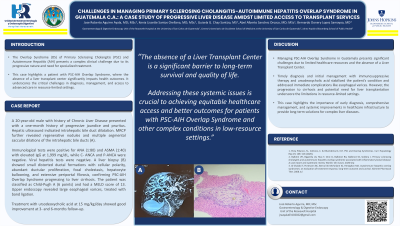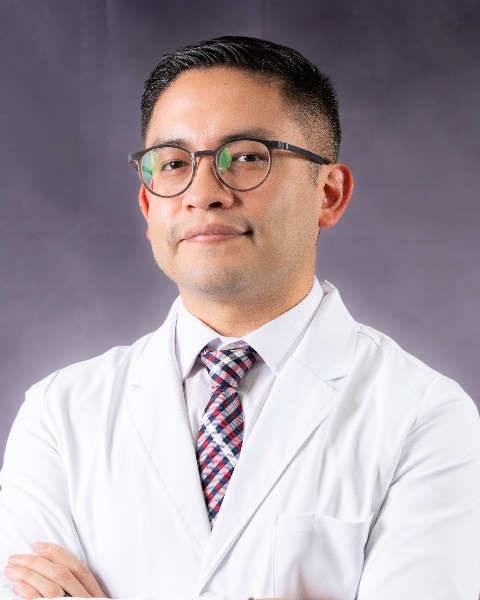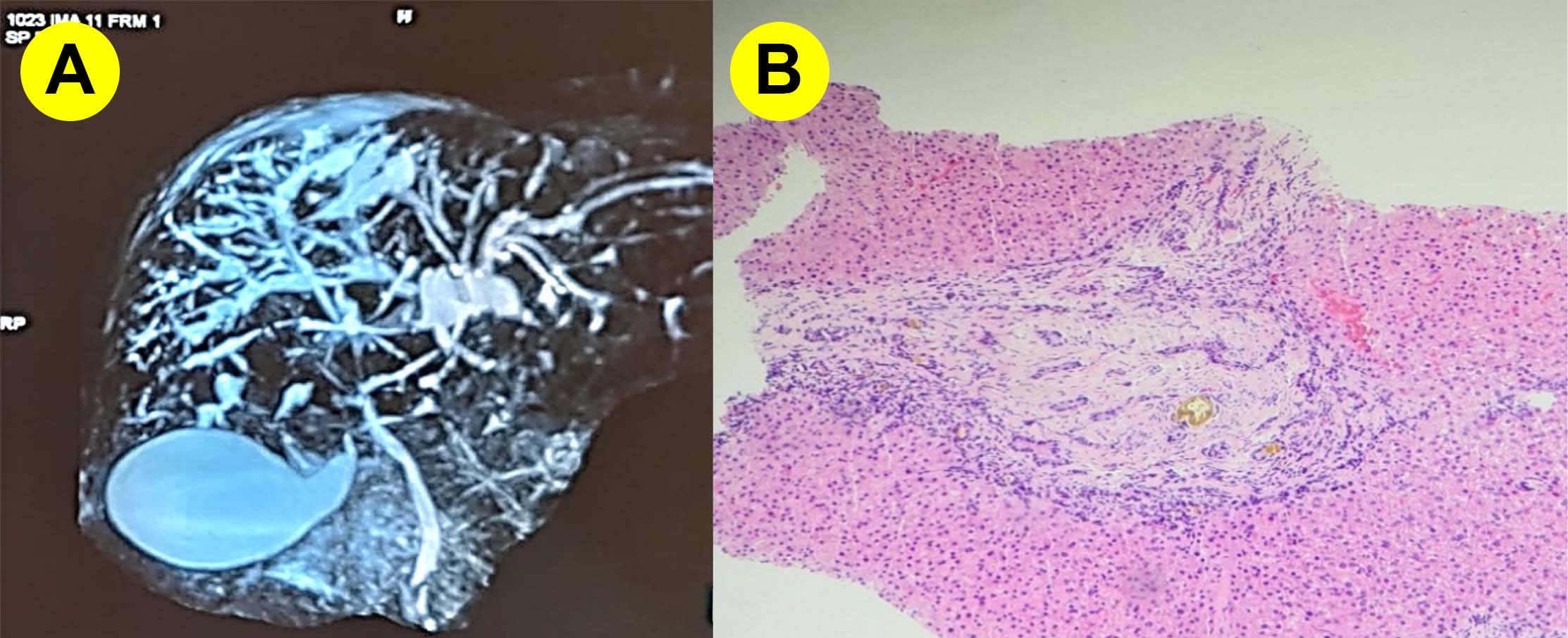Sunday Poster Session
Category: Liver
P1317 - Challenges in Managing Primary Sclerosing Cholangitis-Autoimmune Hepatitis Overlap Syndrome in Guatemala C.A.: A Case Study of Progressive Liver Disease Amidst Limited Access to Transplant Services
Sunday, October 27, 2024
3:30 PM - 7:00 PM ET
Location: Exhibit Hall E

Has Audio

Abel Alberto Sanchez Orozco, MD, MSc
Gastroenterology & Digestive Endoscopy Unit of the Roosevelt Hospital at the University of San Carlos de Guatemala
Guatemala City, San Marcos, Guatemala
Presenting Author(s)
Jose Roberto Aguirre Ayala, MD, MSc1, Kenia Lissette Santos Orellana, MD, MSc2, Guisela G. Chay Santizo, MS3, Abel Alberto Sanchez Orozco, MD, MSc4, Bernardo Donery Lopez Samayoa, MD5
1Gastroenterology & Digestive Endoscopy Unit of the Roosevelt Hospital at the University of San Carlos de Guatemala, Guatemala, Quetzaltenango, Guatemala; 2Gastroenterology & Digestive Endoscopy Unit of the Roosevelt Hospital at the University of San Carlos de Guatemala, Guatemala, Sacatepequez, Guatemala; 3Centro Universitario de Occidente School of Medicine at the University of San Carlos de Guatemala, Quetzaltenango, Quetzaltenango, Guatemala; 4Gastroenterology & Digestive Endoscopy Unit of the Roosevelt Hospital at the University of San Carlos de Guatemala, Guatemala City, San Marcos, Guatemala; 5Johns Hopkins Bloomberg School of Public Health, Baltimore, MD
Introduction: The Overlap Syndrome (OS) of Primary Sclerosing Cholangitis (PSC) and Autoimmune Hepatitis (AIH) presents a complex clinical challenge due to its progressive nature and need for specialized treatment. This case highlights a patient with PSC-AIH Overlap Syndrome, where the absence of a liver transplant center significantly impacts health outcomes. It underscores the critical challenges in diagnosis, management, and access to advanced care in resource-limited settings.
Case Description/Methods: A 20-year-old male with history of Chronic Liver Disease presented with a one-month history of progressive jaundice and pruritus. Hepatic ultrasound indicated intrahepatic bile duct dilatation. MRCP further revealed regenerative nodules and multiple segmental saccular dilations of the intrahepatic bile ducts (a).
Immunological tests were positive for ANA (1:80) and ASMA (1:40) with elevated IgG at 1,999 mg/dL, while C-ANCA and P-ANCA were negative. Viral hepatitis tests were negative. A liver biopsy (b) showed small distorted ductal formations with cellular polarity, abundant ductular proliferation, focal cholestasis, hepatocyte ballooning, and extensive periportal fibrosis, confirming PSC-AIH Overlap Syndrome progressing to liver cirrhosis. The patient was classified as Child-Pugh A (6 points) and had a MELD score of 13. Upper endoscopy revealed large esophageal varices, treated with band ligation. Treatment with ursodeoxycholic acid at 15 mg/kg/day showed good improvement at 3- and 6-months follow-up.
Discussion: Managing PSC-AIH Overlap Syndrome in Guatemala presents significant challenges due to limited healthcare resources and the absence of a Liver Transplant Center. Timely diagnosis and initial management with immunosuppressive therapy and ursodeoxycholic acid stabilized the patient's condition and addressed immediate complications like esophageal varices. However, the progression to cirrhosis and potential need for liver transplantation underscore the limitations in resource-limited settings. This case highlights the importance of early diagnosis, comprehensive management, and systemic improvements in healthcare infrastructure to provide long-term solutions for complex liver diseases.
The absence of a Liver Transplant Center is a significant barrier to long-term survival and quality of life. Addressing these systemic issues is crucial to achieving equitable healthcare access and better outcomes for patients with PSC-AIH Overlap Syndrome and other complex conditions in low-resource settings.

Disclosures:
Jose Roberto Aguirre Ayala, MD, MSc1, Kenia Lissette Santos Orellana, MD, MSc2, Guisela G. Chay Santizo, MS3, Abel Alberto Sanchez Orozco, MD, MSc4, Bernardo Donery Lopez Samayoa, MD5. P1317 - Challenges in Managing Primary Sclerosing Cholangitis-Autoimmune Hepatitis Overlap Syndrome in Guatemala C.A.: A Case Study of Progressive Liver Disease Amidst Limited Access to Transplant Services, ACG 2024 Annual Scientific Meeting Abstracts. Philadelphia, PA: American College of Gastroenterology.
1Gastroenterology & Digestive Endoscopy Unit of the Roosevelt Hospital at the University of San Carlos de Guatemala, Guatemala, Quetzaltenango, Guatemala; 2Gastroenterology & Digestive Endoscopy Unit of the Roosevelt Hospital at the University of San Carlos de Guatemala, Guatemala, Sacatepequez, Guatemala; 3Centro Universitario de Occidente School of Medicine at the University of San Carlos de Guatemala, Quetzaltenango, Quetzaltenango, Guatemala; 4Gastroenterology & Digestive Endoscopy Unit of the Roosevelt Hospital at the University of San Carlos de Guatemala, Guatemala City, San Marcos, Guatemala; 5Johns Hopkins Bloomberg School of Public Health, Baltimore, MD
Introduction: The Overlap Syndrome (OS) of Primary Sclerosing Cholangitis (PSC) and Autoimmune Hepatitis (AIH) presents a complex clinical challenge due to its progressive nature and need for specialized treatment. This case highlights a patient with PSC-AIH Overlap Syndrome, where the absence of a liver transplant center significantly impacts health outcomes. It underscores the critical challenges in diagnosis, management, and access to advanced care in resource-limited settings.
Case Description/Methods: A 20-year-old male with history of Chronic Liver Disease presented with a one-month history of progressive jaundice and pruritus. Hepatic ultrasound indicated intrahepatic bile duct dilatation. MRCP further revealed regenerative nodules and multiple segmental saccular dilations of the intrahepatic bile ducts (a).
Immunological tests were positive for ANA (1:80) and ASMA (1:40) with elevated IgG at 1,999 mg/dL, while C-ANCA and P-ANCA were negative. Viral hepatitis tests were negative. A liver biopsy (b) showed small distorted ductal formations with cellular polarity, abundant ductular proliferation, focal cholestasis, hepatocyte ballooning, and extensive periportal fibrosis, confirming PSC-AIH Overlap Syndrome progressing to liver cirrhosis. The patient was classified as Child-Pugh A (6 points) and had a MELD score of 13. Upper endoscopy revealed large esophageal varices, treated with band ligation. Treatment with ursodeoxycholic acid at 15 mg/kg/day showed good improvement at 3- and 6-months follow-up.
Discussion: Managing PSC-AIH Overlap Syndrome in Guatemala presents significant challenges due to limited healthcare resources and the absence of a Liver Transplant Center. Timely diagnosis and initial management with immunosuppressive therapy and ursodeoxycholic acid stabilized the patient's condition and addressed immediate complications like esophageal varices. However, the progression to cirrhosis and potential need for liver transplantation underscore the limitations in resource-limited settings. This case highlights the importance of early diagnosis, comprehensive management, and systemic improvements in healthcare infrastructure to provide long-term solutions for complex liver diseases.
The absence of a Liver Transplant Center is a significant barrier to long-term survival and quality of life. Addressing these systemic issues is crucial to achieving equitable healthcare access and better outcomes for patients with PSC-AIH Overlap Syndrome and other complex conditions in low-resource settings.

Figure: (A) Liver segmental intrahepatic saccular dilations visualized in a radiographic image. (B) Periductal fibrosis presenting as an "onion skin" lesion observed in a histological section.
Disclosures:
Jose Roberto Aguirre Ayala indicated no relevant financial relationships.
Kenia Lissette Santos Orellana indicated no relevant financial relationships.
Guisela Chay Santizo indicated no relevant financial relationships.
Abel Alberto Sanchez Orozco indicated no relevant financial relationships.
Bernardo Donery Lopez Samayoa indicated no relevant financial relationships.
Jose Roberto Aguirre Ayala, MD, MSc1, Kenia Lissette Santos Orellana, MD, MSc2, Guisela G. Chay Santizo, MS3, Abel Alberto Sanchez Orozco, MD, MSc4, Bernardo Donery Lopez Samayoa, MD5. P1317 - Challenges in Managing Primary Sclerosing Cholangitis-Autoimmune Hepatitis Overlap Syndrome in Guatemala C.A.: A Case Study of Progressive Liver Disease Amidst Limited Access to Transplant Services, ACG 2024 Annual Scientific Meeting Abstracts. Philadelphia, PA: American College of Gastroenterology.
